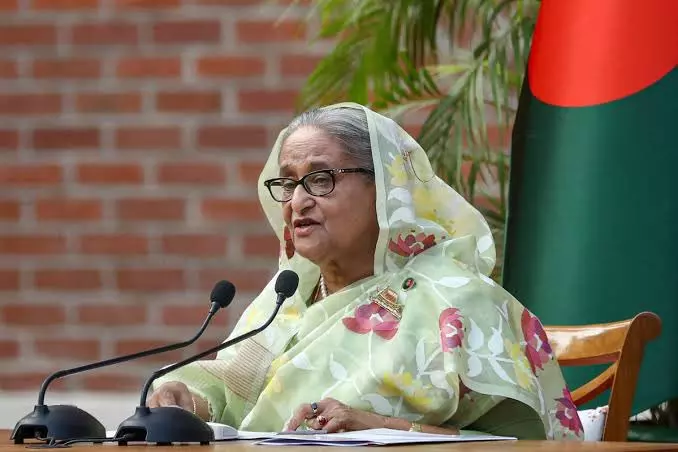
From her refuge in India, Sheikh Hasina hints at US role in her ouster
Hasina’s direct accusation against the US, a close Indian ally, places the Modi government in a dilemma. Washington could pressure New Delhi to impress upon Hasina to hold back her allegations

Deposed Bangladesh Prime Minister Sheikh Hasina, who is currently taking refuge in India, has hinted at the role of the United States in events leading to her dramatic resignation and the regime change in her country.
This is Hasina's first reaction after the unceremonious exit from her country. Hasina’s charge against the US could place New Delhi in an embarrassing situation as she has made the accusation from Indian soil.
'To avoid a procession of dead bodies'
In reports, quoting a “message” to her Awami League supporters, Hasina said she had resigned to avoid a “procession of dead bodies”. Though “they” wanted to come to power over the dead bodies of students, she did not want that and resigned from her post as Prime Minister, she added.
Further, she accused America for her situation. "I could have remained in power if I had surrendered the sovereignty of Saint Martin Island and allowed America to hold sway over the Bay of Bengal. I beseech the people of my land not to be manipulated by radicals," said Sheikh Hasina in her message.
Hasina’s direct accusation against the US, a close Indian ally, places the Modi government in a dilemma. Washington could pressure New Delhi to impress upon Hasina to hold back her allegations. Already, the US is irked by Prime Minister Narendra Modi visiting Moscow despite the West urging nations friendly to it including India to isolate Moscow.
Hasina’s message targeting the US for instigating a coup against her will only serve to irritate Washington especially coming at a time when she is taking refuge in India.
Saint Martin island, located in the southernmost part of Bangladesh, and in the north-eastern part of the Bay of Bengal, measures just 3 square kilometres. In May, Hasina had referred to "conspiracies" being hatched to topple her government.
US's 'interest' in St. Martin's Island
And had claimed that there was a "white man's" plot to create a new "Christian state" out of Bangladesh and Myanmar similar to East Timor. "If I allowed a certain country to build an airbase in Bangladesh, then I would have had no problem," she had said, alleging that she was even offered an easy re-election. At that time, she did not name the country involved.
The St. Martin’s island in the Bay of Bengal is strategically positioned close to Myanmar which can potentially be useful for the US to monitor the country besides China and Bangladesh. Though the US has officially denied it is interested in the island, reports over the years have consistently indicated Washington’s keenness to set up a military/look out post in the island.
The Awami League leader had to resign and flee the country after an agitation by students protesting against reservation in jobs snowballed into an anti-Sheikh Hasina movement forcing her ultimately to step down. As Hasina tried to quell the protests over 400 protesters were killed.
Hasina promises to return soon
According to the 76-year-old leader, if she had stayed in the country, more lives would have been lost and more resources would have been destroyed.
“I made the extremely difficult decision to exit. I have removed myself. You were my strength, you did not want me, so I have left," said the speech, according to news reports.
To her party members she assured them that the Awami League would bounce back and urged them not to lose hope. She promised to return soon. “I have lost but the people of Bangladesh have won, the people for whom my father, my family died," her message said.
Hasina also made it clear that she did not call the protesting students ‘Razakars’. According to Hasina, her words were "distorted" to "incite" them. She urged students to watch the full video of that day to understand how conspirators have exploited their innocence to destabilise the nation.
The term 'Razakars' is often used to refer to people who are believed to have collaborated with the Pakistani military during the 1971 Liberation War.

